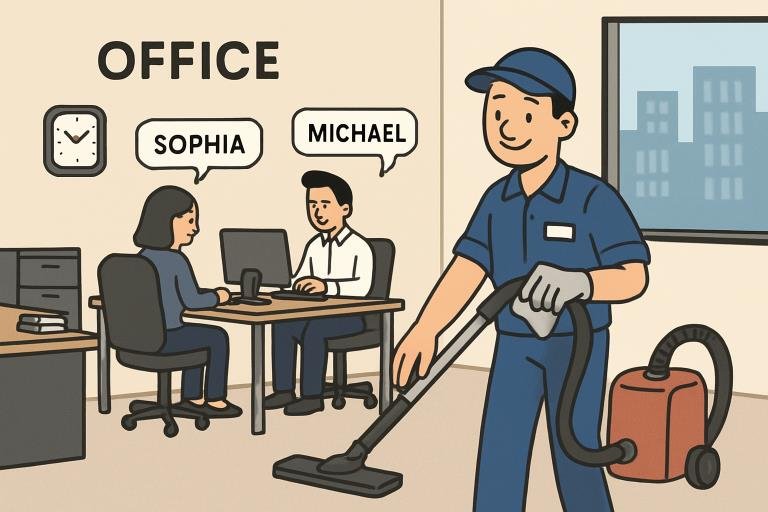Assess Your Office’s Cleaning Needs
Every office is unique, from its size and layout to the nature of daily tasks and the number of employees present. Your first step is to identify what your office requires in terms of cleaning clearly. Do you need daily maintenance of high-traffic common areas? Are there special concerns, such as frequent dust from equipment or the need for eco-friendly products? Understanding your priorities will help you set clear standards for any provider and avoid disappointment.
Whether you’re managing a tech startup, legal office, or creative agency, your requirements will differ. This step sets the foundation for bringing in professional commercial cleaning experts who align with your office’s specific needs, ensuring that employees and visitors enjoy a consistently fresh and productive environment.
Don’t overlook employee feedback when evaluating needs. Survey your team about problem areas or recurring cleanliness issues. This firsthand input can provide valuable insights that may not be apparent in a walk-through assessment and can help build consensus for any proposed cleaning upgrades.
Prioritize health and safety concerns. An unclean environment not only dampens morale but can also pose health risks, especially in high-touch and shared spaces. Identifying these pain points early allows you to seek specialist services, such as those that use hospital-grade disinfectants or offer green cleaning options.
Research and Shortlist Potential Services
With your needs defined, you can begin researching companies with a proven track record of servicing similar demands. Check online directories, community business groups, and third-party review platforms like Google Reviews or Trustpilot to compile a list of contenders. Look for services distinguished by positive testimonials, industry certifications (such as ISSA or CIMS), and a strong local presence.
Company websites often highlight specialties, such as post-construction cleaning or allergy-reducing services, helping you narrow down your shortlist further. Gather initial quotes with clear breakdowns, and ask about their staffing, emergency cleaning capabilities, and protocols for site-specific situations. Transparency and flexibility are significant indicators of a company’s responsiveness and professionalism.
Verify Credentials and Insurance
After finding a few promising options, confirm that each company is appropriately licensed, bonded, and insured. These credentials protect your firm from unforeseen damages or accidents that could occur during cleaning operations. Verify what policies they have in place for employee vetting—including background checks and ongoing training—to ensure trustworthy individuals are servicing your office.
Many reputable cleaning firms proudly display their certifications and insurance details publicly. If such information isn’t readily available, ask directly; a reliable company will be forthcoming and happy to provide documentation. This diligence is especially vital if your building contains high-value assets or sensitive client records, as insurance coverage can protect you from liability in rare but costly incidents.
Understand Pricing and Service Inclusions
Transparent, detailed quotes prevent headaches later. Specify not only surface-level cleaning but also deeper, periodic tasks, like carpet shampooing or interior glass cleaning. Compare apples to apples: Some providers bundle basic supplies and equipment, while others may charge extra for essentials like soap or paper towels. Avoid contracts that seem excessively cheap, as these may indicate rushed jobs or untrained staff.
Clarify cleaning schedules to suit your business hours and inquire about additional services or emergency visits—these may incur a premium or require booking. Many businesses also value providers who offer flexible billing and a straightforward explanation of any ancillary costs.
Evaluate Flexibility and Customization
Modern offices often require cleaning services tailored to their shifting schedules, such as extended hours during major projects or minimal service during holiday downtimes. Select a cleaning service that is willing to adapt its offerings and frequency as your needs change. Providers should accommodate special instructions, support green cleaning efforts if required, and respond to feedback with timely adjustments.
Customization isn’t just about frequency—it can also mean using hypoallergenic products or focusing extra attention on meeting rooms after big client gatherings. Open discussion about these specialized needs ensures a tailored service, not a one-size-fits-all approach.
Check References and Reviews
Before committing, request and check company references. Reaching out to current or recent clients can reveal a great deal about their reliability and responsiveness. Online reviews can also highlight areas of concern or showcase above-and-beyond service. Pay attention to patterns: Are there consistent complaints about tardiness or missed tasks? A timely resolution and consistent satisfaction should be evident, allowing you to feel secure in your decision.
Consult broader forums and business networks for word-of-mouth recommendations. Sometimes, issues and praises raised online don’t surface during sales pitches, offering a more balanced view of the cleaning service’s actual performance.
Assess Communication and Customer Service
Good business relationships depend on responsiveness and clear communication. Ensure that the company you choose provides a designated contact person or account manager you can reach directly, not just a general switchboard or email queue. Quick responses to inquiries and clear escalation policies for any dissatisfaction or unforeseen issues are essential. This clarity can be the difference between a quickly resolved concern and days of frustration.
Discuss how service feedback is collected—whether through periodic surveys, on-site check-ins, or follow-up calls. Active customer service demonstrates that a provider values long-term partnerships, not just one-off contracts, which is crucial for high-performing office environments.
Consider Trial Periods and Contracts
Negotiate a trial period before committing to longer-term contracts. This pragmatic approach enables your office to evaluate punctuality, consistency, and the overall quality of work under real-world, day-to-day conditions. Ensure that you review all contract terms thoroughly, paying close attention to notice periods, cancellation terms, and any escalation procedures for missed targets. A fair contract should allow for adjustments as your needs or satisfaction levels change, making it easier to scale up or pivot services as your business evolves.
Trial runs are also valuable for giving both your team and the cleaning provider a chance to get comfortable working together, identifying any necessary adjustments to ensure the best long-term fit.
Conclusion
Choosing the exemplary office cleaning service is a structured process that protects your workplace, boosts morale, and improves daily efficiency. By thoroughly vetting each candidate and prioritizing transparency, communication, and flexibility, you’ll invest in a partnership that sustains your business success while maintaining a healthy, organized environment.



